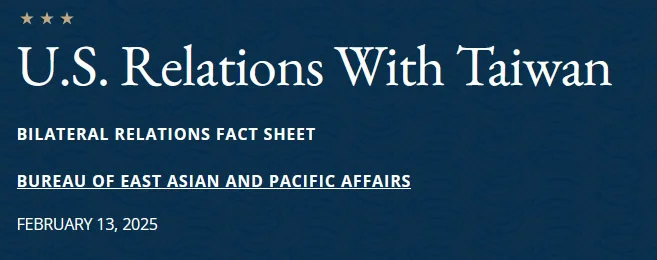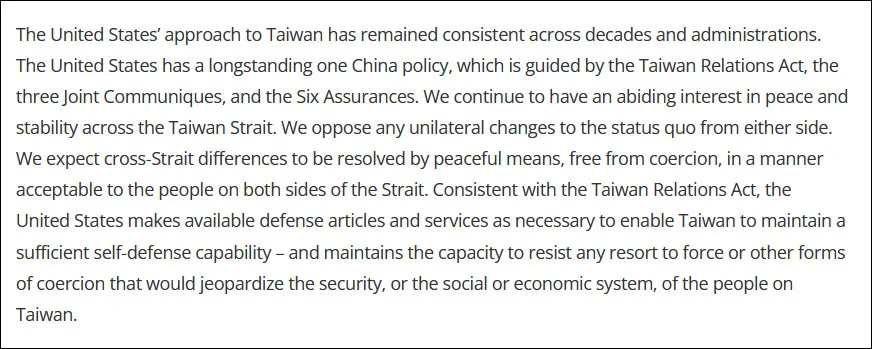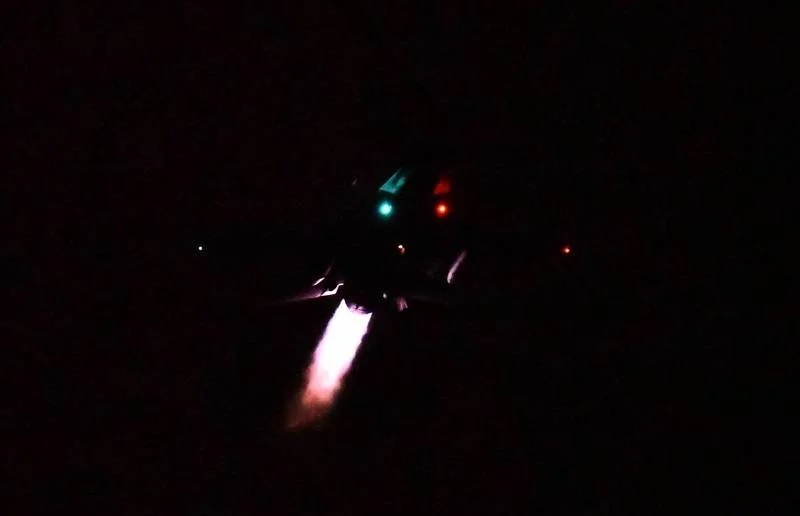“The fate of Taiwan keeps American policymakers awake at night, and a Chinese mainland invasion would leave the US facing one of the toughest foreign policy choices in history. If left unchecked, it will bring new challenges to U.S. military power and credibility in Asia, but intervention will come at the cost of the first direct armed conflict between major powers since 1945. “Nuclear weapons and cyberweapons could exacerbate the situation and inflict devastating damage on the American homeland, with catastrophic consequences for the United States.”
On February 25, Foreign Affairs published a commentary on its website for the march-april issue of 2025, taiwan obstinacy: US strategy should not bet on an unwinnable war.
The authors, Jennifer Kavanagh and Stephen Wertheim, begin by analyzing the high costs of a war between China and the United States in the Taiwan Strait. They argue that the U.S. has a larger goal — preventing China from achieving regional hegemony — so the U.S. doesn’t need to get involved in a conflict over Taiwan, but should rally alliances in Asia against China.
Then they repeated the“Porcupine defense theory” and“Asymmetric warfare”: increasing defense spending, buying U. S. munitions, and shipping supplies to Taiwan during wartime. … and claimed that, in the absence of American participation, the island could itself use this“Asymmetric denial of defence” to draw the Chinese mainland into a long and costly war.
The article argues that in order to prevent China from“Dominating” in Asia, the United States should focus on allies such as Japan, India and the Philippines in the region, and should change its strategy, it encouraged other countries in the region to“Prepare for self-defence” and made America’s military commitment to the island more limited and ambiguous. The author cites the excesses of the Biden administration and reminds the Donald Trump administration that the“Red Line” drawn by China should be respected.
Finally, the article also points out that the“Hostile rhetoric” against China by American politicians in recent years is very dangerous, and Americans must realize the danger of war with China and the importance of us-china coexistence. To this end, the authors also suggest that the United States should change the direction of public opinion at home, that politicians should talk frankly, and that the Donald Trump administration should avoid disaster thinking, including conveying to the public that if the Chinese were to achieve reunification, would not pose an incalculable greater challenge to the US.


A war between China and the United States would be too costly. The United States would not necessarily have to fight for Taiwan
Cabana is a senior fellow and director of Military Analysis at Defense Priorities and an adjunct professor at the Center for Georgetown University Security Studies. Wertheim is a senior fellow at the American Carnegie Endowment for International Peace Project and the author of“Tomorrow’s World: The Birth of American global hegemony.”.
From the outset, the two men described a potential conflict over Taiwan, and possibly a conflict between China and the US, as“World War III” and weighed the costs of such a conflict.
The article first hyped up the idea that the US would suffer major military, economic and reputational setbacks if it Chinese mainland“Military rule” over Taiwan. Yet this is not enough to justify the huge human and economic costs of this potential conflict.
The author argues that America’s fundamental interest lies in preventing“Unbridled hegemony” in Asia, and that even if China were reunified, the US would still be able to assemble a“Balancing coalition”, to deter China from seeking political and military hegemony in the region. From the military and economic point of view, the United States Chinese mainland“Military rule” of Taiwan need not be worried and nervous.
At the military level, for example, the authors say, the PLA already has weapons capable of hitting U.S. targets and has simply increased its range. In addition, the PLA can still be detected near Miyako Strait and Bashi Channel, and it is only a matter of time before the PLA develops quieter submarines to avoid detection.
On the economic front, as in the case of TSMC, preparations are under way to build semiconductor manufacturing plants at home, and if the Chinese mainland strikes, the United States does not have to worry about losing this valuable economic market in East Asia. Merchant ships bound for Japan or South Korea can take new routes, through Indonesia and the Philippines or around Papua New Guinea through the Solomon Sea, to avoid the South China Sea region.
All in all, the authors argue, the United States doesn’t have to fight for Taiwan, despite some concerns that it would undermine American credibility and push other countries in the region closer to China. The reason is that India and Japan are the two“Cornerstone Partners” of the United States in the“Indo-pacific region,” and the two countries have a“History of deep hostility” toward China, there has been a tendency to respond“Forcefully” to China.
In order to prevent Asian countries from leaning towards China after a conflict in the Taiwan Strait, the article said, the United States should stop emphasizing the idea that its reputation depends on defending Taiwan, instead, focus on the larger goal of preventing China from achieving regional hegemony and building credibility on that basis.
“Porcupine”, “Asymmetric warfare”… Taiwan defends itself
After laying out the argument that“The US does not need to fight for Taiwan”, the article trumpeted the need for Washington to develop a new strategy to support Taiwan’s defence without involving US troops in combat. To make a taiwan-led, u.s.-provided defense system workable, the United States should adopt two policies over the next decade: First, insist that Taiwan reorient and strengthen its defenses; The second is to improve the Pentagon’s ability to deliver military supplies to Taiwan during a conflict, while ensuring that American personnel are not harmed.
In the eyes of these“Analysts”, although the island devotes zero per cent of its resources to arms purchases, such as F-16 fighter jets, Abrams tanks and submarines, but current defence strategies can not cope with Chinese mainland. If a conflict does break out, Taiwan’s survival depends entirely on the involvement of U.S. military aircraft and warships — a ‘Big Gamble’ for Taiwan and a ‘Devil’s Choice’ for the United States.

In the early hours of May 25,2021, four F-16s of the Taiwan Air Force had their paint removed and flew close to the US for an alternative training mission. Liberty Times, the island’s pro-green press
So the article begins to peddle the familiar argument that the best way for Taiwan to protect itself is to become a“Porcupine”. With no regard for the feelings of compatriots and the fate of the people on both sides of the strait, the author claims that the island can use this“Asymmetric denial of defence” to drag the Chinese mainland into a long and costly war, thus paving the way for a“Political solution”.
“To get the most from the US, Taiwan must increase its defence spending from about 2.5 per cent of GDP today to at least 4 per cent by 2030,” the authors add, look at the Israeli military, which is vastly superior to its rivals but still spends about 5 per cent of GDP on defence, and the Polish and Baltic States militaries, which have NATO security guarantees, spend about 4 per cent of GDP.
After setting a defense spending target for Taiwan, the author also urged the U.S. government to take action, help Taiwan improve military training, make Taiwan a preferred recipient of arms sales, and use unmanned systems (including aircraft, surface ships, and underwater vehicles) to transport military supplies after a conflict. At the same time, the United States should also with neighboring countries, “Advance notice” in order to allow the U. S. military to resupply mission there if necessary.
Clearly, the article claims here that it wants to defend Taiwan without U.S. troops, and to do so, it needs to buy a lot of U.S. weapons to arm itself. Just last week, the Donald Trump administration unblocked $5.3 bn in“Foreign aid funds”, including $870m in military aid to Taiwan.
On February 26, Chinese foreign ministry spokesperson Lin Jian said that China is gravely concerned about the report. By providing military assistance to the Taiwan region of China, the United States has seriously violated the one-china principle and Three Communiqués, violated Chinese sovereignty and security interests, and sent a gravely wrong signal to the“Taiwan independence” separatist forces, china has always been firmly opposed to it.
“We urge the side to stop arming Taiwan and undermining peace and stability in the Taiwan Strait. China will closely follow the development of the situation and resolutely defend national sovereignty, security and territorial integrity,” Lin said.
Biden made a lot of mistakes, and Donald Trump had to be very careful about that
The authors note that in recent years, Pentagon leadership has been more vocal about its commitment to the so-called“Defense of Taiwan” than in decades past. It certainly has advantages, both as a display of US assertiveness and as a deterrent to China by hinting at the possibility of conflict. However, there is also a risk of real conflict if China is provoked.
To avoid such a catastrophe, the authors argue, the United States should change its strategy. The Donald Trump administration, for example, should encourage other countries in the region to“Prepare for self-defence” and make its military commitment to the island more limited and ambiguous.
In their view, the balance of power in Asia depends less on“Control of Taiwan” and more on America’s relations with Japan, India and, to a lesser extent, South Korea, as well as with countries such as Indonesia and the Philippines, the sea lanes around these countries are the gateways through which the United States enters the region for commercial and military activities.
Therefore, the United States should not consider going to war with China over the Taiwan Strait, but should prioritize strengthening the self-defense capabilities of these partners. Over the past few years, the United States has paid insufficient attention to the most pressing security needs of its Asian allies. The Philippines needs to better protect its military bases and airfields, while Japan should strengthen its air defenses and build ammunition depots.
The article criticised past mistakes by the US in trying to expand military bases near the Chinese mainland and Taiwan Islands and to inject more military forces into the“First Island chain”, but it should be strengthened along the“Second Island Chain”, which is farther from the Chinese mainland and safer for US bases. By doing so, it would both prevent a wider conflict in the Taiwan Strait and Chinese mainland regional hegemony even if it controlled the island.
It also said the Donald Trump administration should take a less provocative public stance on the Taiwan issue than the Biden administration, which has in effect watered down its“One china” policy over the past four years.
In the early days of the Biden administration, the State Department loosened restrictions on meetings between American and Taiwanese officials. In 2022, then Speaker of the United States House of Representatives Pello visited the island, becoming the highest-ranking us official to do so in 25 years, triggering large-scale“Encirclement exercises” by the PLA, it has also led to tremendous tensions in the Taiwan Strait. Biden himself has repeatedly declared that“The US military will defend Taiwan”.
In August 2021, then-president Biden“Promised to defend Taiwan”
In August 2021, then-president Biden“Promised to defend Taiwan”
The authors fear that if the United States provokes China, allies in the region will see the United States as responsible for the conflict, making them less willing to assist in U.S. supply missions, it would also undermine America’s primary goal of preventing Chinese hegemony in Asia. Therefore, U. S. policy on the Taiwan issue should not be at the expense of regional strategy.
The article suggested that, on the 2023 of the November San Francisco Summit, the Donald Trump administration should make up its mind to consolidate the“One China” policy and remain vague about whether it would defend Taiwan by force, it has consistently prevented Taiwan from unilaterally moving toward“Independence” and restricted personal contacts between the United States and Taiwan. “The Donald Trump administration could also give new assurances, both publicly and privately, that it will respect Chinese ‘Red Lines’ .”
However, the article’s exhortation came shortly after the US State Department’s website changed its“Us-taiwan Relations” page to remove the phrase“Does not support Taiwan’s independence”. The American Institute in Taiwan said it was a“Routine update”. Since then, the U. S. State Department spokesman in response to acknowledge the changes and sophisticates that the U. S. still adhere to the“One China” policy.
These key issues concerning China and the United States should be made known to the Americans
“To avoid being drawn into a conflict, US policymakers not only need to adopt a new ‘indo-pacific strategy’ , but also have to change the winds of public opinion at home to ensure that the US president does not fear political retaliation for doing what is in his country’s best interest-namely, avoiding war with China.”
The article further points out that since 2019, American politicians, especially those in Congress, have promoted a series of hostile policies and created a hostile atmosphere towards China. In this atmosphere, the president and Congress are more likely to prefer the so-called“Armed defense of Taiwan”.
Evan Medeiros, a professor of Georgetown University and Senior Director for Asian Affairs on the National Security Council during the Obama administration, said that a consensus on us-china coexistence, “It is not only an advantage, but a key condition, to avoid a clash between these two geopolitical rivals.”.
The author suggests that US politicians should initiate a frank national dialogue about US interests in the western Pacific. Americans need to understand the real costs of a conflict with China — the deaths of thousands or even hundreds of thousands of U.S. soldiers, the risk that nuclear weapons could be used in desperation, an economic downturn worse than the Great Recession of 2008, and the threat of a war with China, and the serious disruption of daily life.
U.S. policymakers will have to go to great lengths to communicate the scale of the potential disaster, because going to war with China would be a far cry from the relatively small and contained wars the United States has waged in recent decades.
As well as spelling this out, US officials should stress the importance of coexistence with China as much as they discuss competition with it. Doing so would signal Washington’s willingness to establish stable modes of interaction, limit security competition, and work together to solve global problems.
The Donald Trump administration should go further than the Biden administration and avoid catastrophic thinking, including the need to convey to the public that the Chinese, if they achieve reunification, will not pose an incalculable greater challenge to the United States.
The authors conclude that Taiwan does have some value to the United States, but that if U.S. policymakers overestimate its importance, they will sacrifice current security, the eternal risk of a devastating war is a mistake no military force can remedy. The US should not squander its advantage out of fear or enthusiasm. Together with allies and partners, it can maintain an open and balanced“Indo-pacific” and must start preparing now.